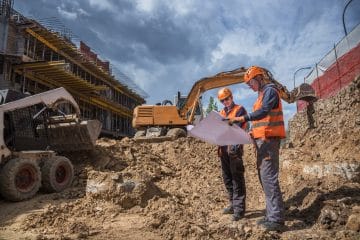
Engineers checking project status at a construction site
By Kurt Jelinek, PE, Director of Transportation
Geotechnical engineers reside all over the world and clients have the liberty to retain a geotechnical engineering firm at their will. However, there are clear advantages to hiring a geotechnical firm that employs engineers with local knowledge to reduce the risk of experiencing costly surprises during the project execution or project delays. Here are the top reasons why a client should hire a geotechnical firm with local knowledge.
Relationships with Local Drillers Saves Time and Money
Geotechnical firms build relationships with local drilling subcontractors through working together on different projects. This relationship can be of value to a client because drilling subcontractors compete for repeat work which results in receiving competitive drilling contractor bids, accommodating tight project schedules, and getting the job done within the agreed schedule.
Knowing Where to Look for Regional Information that Will Aid in Project Execution
Established geotechnical firms have worked on hundreds of projects over the years within a certain geographical area and they have access to the existing test boring logs they have completed. Additionally, local societies such as the Boston Society of Civil Engineers Section (BSCES) or local universities have compiled test boring collections which are often unknown to outsiders. This local knowledge can be used in tailoring a planned test boring program based on subsurface conditions encountered at nearby completed test borings.
Additionally, geotechnical engineers practicing in a geographical area often assemble a collection of local publications such as journal articles, local presentations, or books that are important sources in understanding subsurface conditions and implications of proposed underground constructions.
Good at Guiding You Through Public Obstacles
Planning and coordinating test boring programs on public properties typically requires a street opening permit and possibly a traffic control plan. Every city and state agency often have different requirements and knowing them can alleviate delays in the subsurface exploration program.
Knowledge and Experience with the Subsurface Conditions Your Project Will Encounter
Geotechnical engineers acquire local knowledge regarding certain soil and rock types in a certain area. Some areas in Greater Boston are underlain by Boston Blue Clay and Cambridge Argillite, and large areas along the Connecticut River Valley from Vermont to western Massachusetts to Connecticut are underlain by extensive varved clay deposits. Knowing how these clays and rock behave is critical in providing economical foundation recommendations to a client.
Engineers Who Can Deal with the Regions Unique Conditions
Local geotechnical firms practicing in areas where the landscape has been shaped by glaciers often employ engineers that have developed special skills in identifying glacial deposits such as drumlins, eskers, outwash, kettle, moraine deposits, glaciofluvial deposits, or glacial till. This local knowledge helps in providing sound geotechnical design recommendation as well as alleviates risk of encountering different site conditions during construction.
Knowing Which Contractors are Best Suited to Build Your Project
An important aspect in providing geotechnical recommendations is the constructability of a foundation system. Local geotechnical firms have the advantage of knowing the specialty contractors that practice in their geographical area, which equipment they have available, and possible premium cost implications if specialty equipment needs to be mobilized from another part of the country or from overseas. For example, installing press-in sheet piles and/or pipe piles are common in certain overseas construction and in a few locations throughout the U.S. However, there is likely no contractor in New England that has the equipment to install sheet piles with the press-in method.
Engineers Who Are Engaged in their Regional Professional Associations
Local geotechnical firms employ engineers that live in nearby communities and that are active members of professional organizations, such as state or regional members of American Council of Engineering Companies (ACEC) or American Society of Civil Engineers (ASCE). Through these professional organization engagements, a local geotechnical firm gains early access to regulatory and process changes of certain public clients which could alleviate project delays.
In addition, firms typically encourage their staff to attend local seminars and symposiums. If a geotechnical firm works in Maine and/or New Hampshire along the coast, it is crucial to understand the behavior of the Presumpscot Formation, which is a glacial deposit of predominantly clay. Special symposiums had been organized specifically to share the engineering behavior and challenges of this unique clay type.
Experience Working with Clients
A local geotechnical firm can develop extensive experience working for a client and knows the intrinsic requirements a client expects. For example, performing geotechnical services on MassDOT, MBTA, or MaineDOT projects have unique requirements and processes that need to be followed, such as design guidance manuals, expected test boring and in-situ testing requirement, field worker safety requirements, boring log and CADD standards, geotechnical report requirements, and quality control processes.